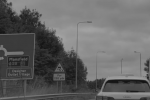Today, I spoke in the debate on the Transport Committee's report on smart motorways, which highlighted a number of safety concerns, and of which the government is implementing all the recommendations. The M1 forms the spine of our constituency, the vast majority is all-lane running smart motorway, and I remain to be convinced of the benefit to our local communities.
I welcome the Transport Committee's report and the Government’s response.
The spine of my constituency is junctions 28 to 30 of the M1, in which we have 30 miles of all lane running smart motorway. To the south is junctions 25 to 28, which is a controlled motorway, and to the north is junctions 30 to 35a, which is 19 miles of smart motorway. The section just to the north of my constituency, around Woodall services up to Sheffield, is the section in which unfortunately many people have lost their lives, including people from neighbouring Rotherham and Mansfield. Grahame Morris referred to people giving evidence and those bereaved families, and our hearts go out to them.
It is a very difficult stretch of motorway from Nottingham up to Leeds, and it is undoubtedly over capacity: the amount of traffic that goes up that stretch is beyond what that road was initially designed to cope with. The smart motorway was seen as a solution to that issue, but I am not sure that it has been wildly successful. Anyone who lives in my constituency will know that we make regular appearances on the Radio 2 traffic bulletins, because the section between junctions 28 and 30 seems to have an accident on a fairly regular basis.
It is with that in mind that I read the report, and there are significant concerns about whether the introduction of the smart motorway has had the desired effects. I am not sure that it has. I am not sure that it has improved safety—as my hon. Friend Chris Loder just outlined, there are significant concerns about that—but there is also an issue with the road network in my part of the world and the fact that the A1, which covers a very similar stretch, does not do its fair share of lifting, because it is not really fit for purpose and needs significant investment. I am sure that if my hon. Friend Alicia Kearns were here, she would argue the same case.
However, I want to go back to the context that the M1 is absolutely central to the local economy in Bolsover. We have a huge number of logistics firms, so when the smart motorway—or the motorway in general—is not working, that has a big impact on the local economy. A number of my constituents are constantly caught in traffic jams because when the M1 is not running, to my west it can back up almost all the villages in my constituency, and to my east there is a significant pressure because people try to get over to the A1 on the A619, which runs through parts of my constituency and that of my hon. Friend Brendan Clarke-Smith. That has a big impact on a lot of my villages, Whitwell in particular, because of the number of diverted heavy goods vehicles.
Added to that context—the Minister will smile wryly at this point—is the fact that some of my motorway junctions on that particular stretch are not fit for purpose. In particular, junctions 28 and 29 are suffering, which is having a huge, detrimental economic impact on us. I am working with Highways England—or whatever it is referred to now—to improve that particular situation, but a smart motorway on junctions 28 to 30 has brought a huge amount of congestion, an increase in near misses and a problem with air pollution, particularly in the south of my constituency around South Normanton and Pinxton. I appreciate that the rationale behind the decision to bring in a smart motorway was to increase capacity on a particularly difficult stretch, but I sympathised with the hon. Member for Easington when he said that it was perhaps just a cheap alternative to properly upgrading the motorway and strategic road network in that patch.
Given that we are in the heart of the country, it is worth pointing out to the Minister that further work needs to be done, and that is before we come on to safety. I drive down from my constituency to Westminster on a regular basis. There is a new bit of smart motorway being installed between, I think, junctions 13 and 16— hopefully someone will correct me if I am wrong—but there are other stretches in which the red Xs are totally ignored on a regular basis. I regularly see emergency vehicles unable to get to where they need to get to, and that is a worry, because we are creating an additional problem that I see on a weekly basis.
My hon. Friend the Chair of the Transport Committee spoke about the evidence regarding the benefit-cost ratio of smart motorways, and the fact that Professor Metz—I think it was him, but forgive me if I have got that wrong—was concerned about whether the return on those projects has been what we want them to be, or whether it is a one-off hit. I think he said that in the first year, they show a return on investment, but then the problems continue.
My experience locally indicates that although we have a smart motorway, it is not doing what it needs to do. As such, although I welcome the report and completely echo the concerns about safety, I have to conclude that I am not sure smart motorways are the answer. I appreciate all the comments made by the Chair of the Select Committee about smart motorways being a good thing, but I am not sure that I entirely agree with him. I wish the report had gone perhaps slightly further by looking at what else could be done to improve the road network, but that may be a separate point. It is an important report and I very much welcome the Government’s proactive stance on taking forward the recommendations. I hope the Minister has heard the plight that many of my constituents face, and that she will be proactive in looking for solutions with all the stakeholders involved. Again, I thank the Select Committee and thank everyone for listening.
- Link to this speech In context Individually
- (Citation: HC Deb, 13 January 2022, c344WH)



